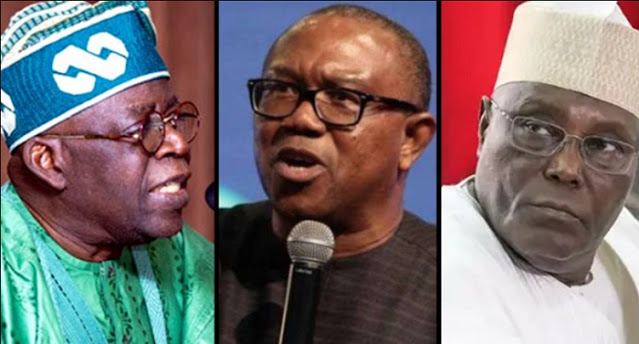…APC governance now based on fear, obedience, control
… Stop remote governance, reconnect with the people – Obi tells Tinubu
In a rebuke of President Bola Ahmed Tinubu’s Democracy Day address on Thursday to the National Assembly, key opposition figures including former Vice President Atiku Abubakar, Labour Party leader Peter Obi, and Senator Seriake Dickson, have accused the president of subverting Nigeria’s hard-won democratic gains and weaponising state institutions to silence dissent.
Former Vice President and 2023 PDP presidential candidate, Atiku Abubakar, in a Democracy Day statement, condemned Tinubu’s administration for what he described as a deliberate erosion of democratic values.
Atiku said, “What we are witnessing is not governance — it is conquest. This government represents the lowest ebb in our democratic journey. Institutions have been weaponised. Policies are crafted not to empower the people but to entrench fear, obedience, and control.”
Atiku accused the APC-led government of operating with “an unmistakable intent to dominate, subdue, and silence.”
He lamented that the democratic promise that emerged in 1999 is now “being steadily dismantled before our very eyes.”
Referencing national infrastructure contracts and symbolic national honours, Atiku alleged nepotism and institutional abuse: “Contracts for multi-billion-naira infrastructure are funnelled to cronies and family associates of the president. National institutions, once symbols of unity, are being brazenly renamed in honour of a sitting president — as though the country were a private estate.”
He added: “Those who laid down their lives did not do so for Nigerians to groan under the yoke of authoritarianism and economic suffocation.”
Meanwhile, Labour Party presidential candidate, Peter Obi, said Atiku’s concerns and directly criticised Tinubu’s approach to governance.
Speaking to reporters in Lagos, Obi said: “It is no longer acceptable to govern from a distance while the people suffer. Nigerians are hungry, unemployed, and angry. We do not need symbolism; we need leadership. It’s time to stop remote governance and reconnect with the people.”
Obi challenged the president to “leave the scripted speeches and take urgent steps to reverse the worsening cost of living, insecurity, and mass disillusionment across the country.”
Also, Senator Seriake Dickson of Bayelsa West also faulted Tinubu’s Democracy Day remarks, stating that the president failed to speak to the ongoing democratic crisis in Rivers State and other flashpoints where constitutional norms are being disregarded.
He said: “The president’s silence on the democratic crisis in Rivers State is deafening. Democracy is not just about symbolism and public declarations. It’s about practical respect for the rule of law and the will of the people. On that score, this government is failing.”
In his address to the joint session of the National Assembly, President Tinubu had rejected claims of pursuing a one-party state.
He said: “To those who ring the alarm that the APC is intent on a one-party state, I offer you a most personal promise, Nigeria will not become such a state now.
He added: “While your alarm may be as a result of your panic, it rings in error… Look at my political history. I would be the last person to advocate such a scheme.”
However, opposition voices remain sceptical. Atiku said the administration’s rhetoric does not match its actions. “Opposition voices are being systematically erased,” he warned.
Atiku called on Nigerians to support a united opposition effort to “reclaim Nigeria for Nigerians,” stating: “This is not just a political contest; it is a moral crusade… a struggle to liberate our economy, our democracy, and our dignity from the grip of authoritarian forces.”
Despite the criticism, Tinubu used his Democracy Day speech to commemorate Nigeria’s return to civilian rule and to honour those who had sacrificed for it.
He conferred posthumous national honours on a wide range of pro-democracy figures including Alhaja Kudirat Abiola, who was awarded the CFR, as well as Shehu Musa Yar’Adua (GCFR), Pa Alfred Rewane (CFR), Rear Admiral Ndubuisi Kanu (CON), Dr. Beko Ransome-Kuti (CON), and Alhaji Balarabe Musa (CFR). Also honoured posthumously were the Ogoni Nine, including Ken Saro-Wiwa (CON), Paul Levera (OON), Barinem Kiobel (OON), and their colleagues, alongside a presidential pardon extended to them under the prerogative of mercy.
Among the living, Professor Wole Soyinka was decorated with the GCON, while renowned public figures such as Bishop Matthew Hassan Kukah, Dapo Olorunyomi, Bayo Onanuga, Nosa Igiebor, Ayo Obe, Dare Babarinsa, Senator Shehu Sani, and Governor Uba Sani were all awarded national honours for their contributions to the democratic space.
The legendary journalist and publisher Uncle Sam Amuka Pemu was also conferred with the CON honour on the eve of his 90th birthday.
Also, Tinubu honoured several legal activists, media veterans, academics, and civil society advocates with various national commendations. These included Barrister Femi Falana (CON), Professor Olatunji Dare (CON), Barrister Felix Morka (CON), and Hon. Labaran Maku (OON), among many others, in what he described as a tribute to “those who dared dictatorship and championed the cause of justice and liberty.”
While the president pledged a commitment to sustaining the tenets of dialogue, civil liberties, and tolerance—saying, “Call me names, call me whatever you will, and I will still call upon democracy to defend your right to do so”—opposition leaders contend that the administration has failed to reflect such values in practice.
Obi and Dickson also urged greater political accountability, a more people-centred economic policy, and constitutional respect across all arms of government.


